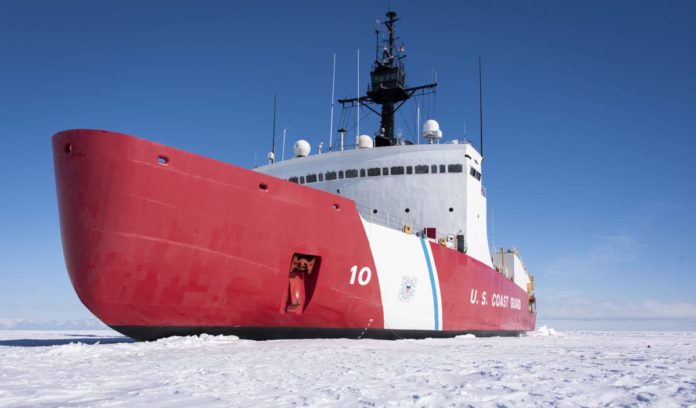
Health precautions prompted by the novel coronavirus pandemic are steering the U.S. Coast Guard Cutter Polar Star north to the Arctic this winter for an 82-day deployment, primarily in the Bering and Chukchi seas, for the first time since 1984.
Coast Guard officials said change of plans to supply this year’s Operation Deep Freeze in Antarctica offered a unique opportunity to provide a winter presence in the Arctic. This mission highlights the importance of the Coast Guard’s Polar Security Cutter program and the need for a larger heavy icebreaker fleet to safeguard vital economic and national security interests in the Arctic.
For the past seven years the Polar Star has operated in Antarctica in support of Operation Deep Freeze, the annual joint military service mission to resupply the U.S. stations at Antarctica.
The Polar Star typically deploys to Antarctic each winter to break ice near McMurdo Station and provide a vital escort to ships bringing in supplies. From there the Polar Star heads north to dry dock in the U.S. for maintenance and repairs in preparation for the next ODF mission.
This year, due to weather, ice conditions and the pandemic, the ice pier could not be reestablished in time for the resupply effort. Implementing a mobile causeway solution normally built for the resupply effort would have required over 100 personnel, which the Coast Guard said cannot be done without significant risk related to the pandemic.
Instead, the U.S. Antarctic Program’s annual resupply will be delivered via aircraft.
Meanwhile in the Arctic, the Coast Guard said the presence of the Polar Star would advance U.S. interests through a blend of polar operational capability, regulatory authority and international leadership efforts.
“The Arctic is no longer an emerging frontier, but is instead a region of growing national importance,” said Vice Adm. Linda Fagan, commander of U.S. Coast Guard Pacific Area. “The Coast Guard is committed to protecting U.S. sovereignty and working with our partners to uphold a safe, secure and rules-based Arctic.”
CORRECTION: This article originally stated that Operation Deep Freeze in Antarctica was cancelled this year due to risks posed by the novel coronavirus pandemic. Only the resupply mission by the Polar Star was cancelled for this year, with the U.S. Air Force delivering personnel and cargo needed, said military officials at Joint Base Lewis-McChord in Washington state.














